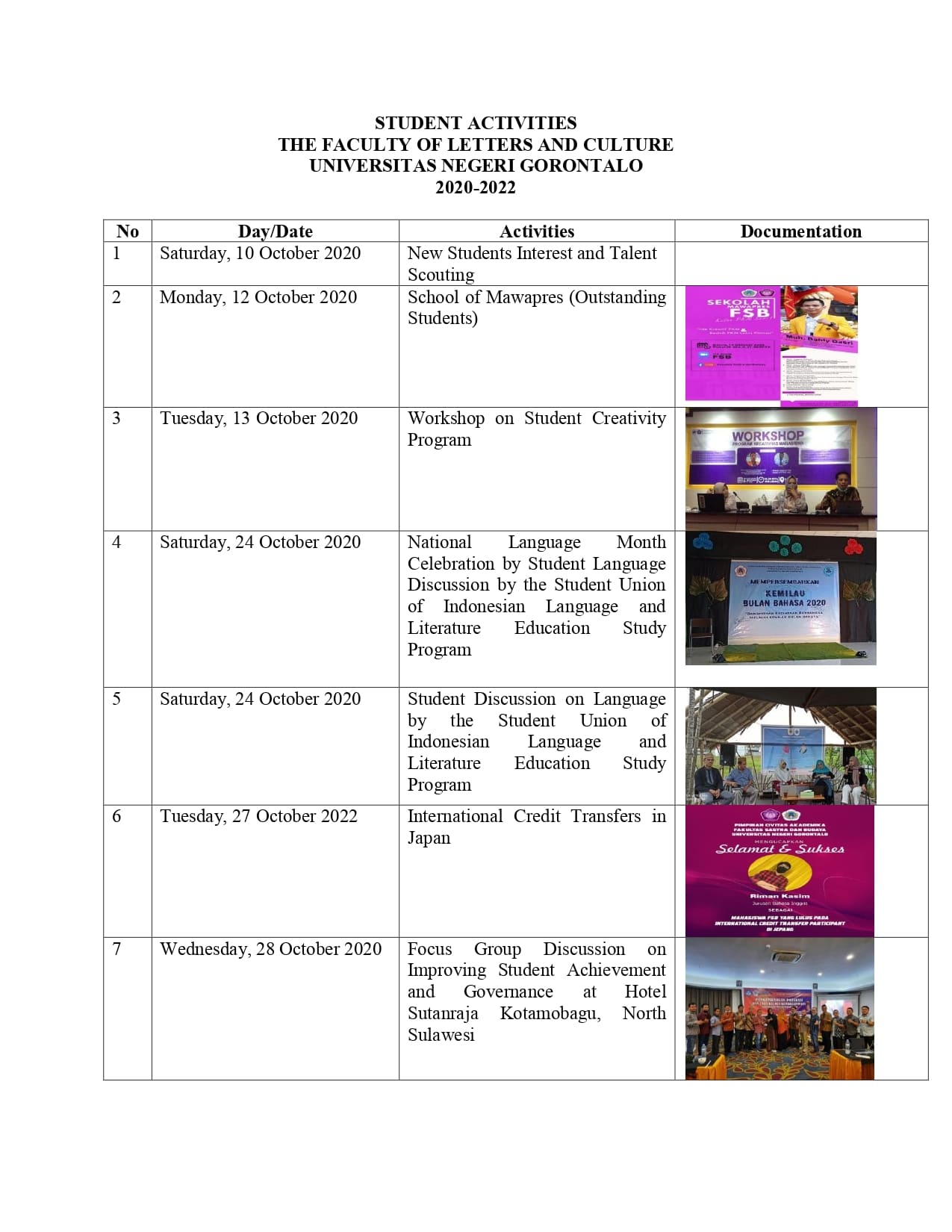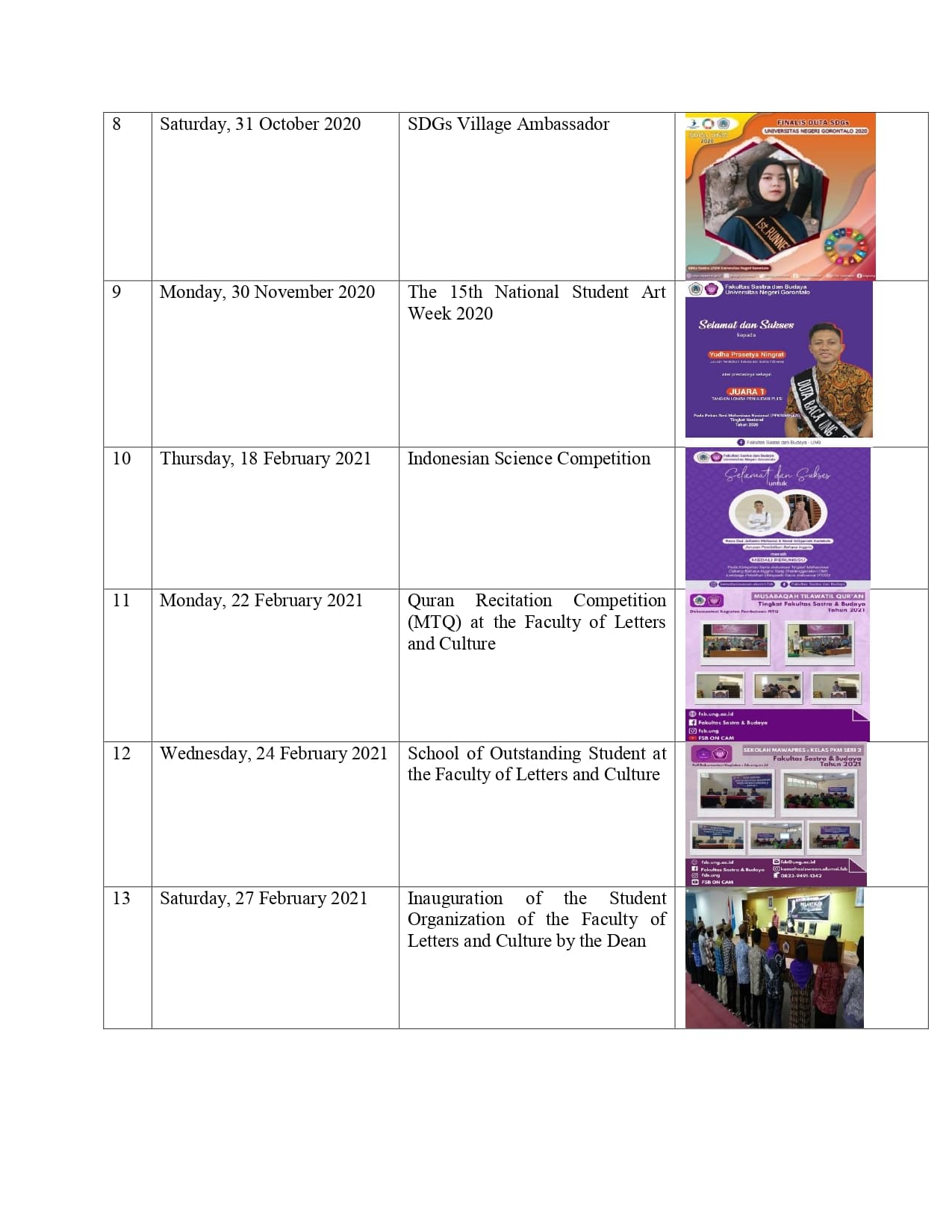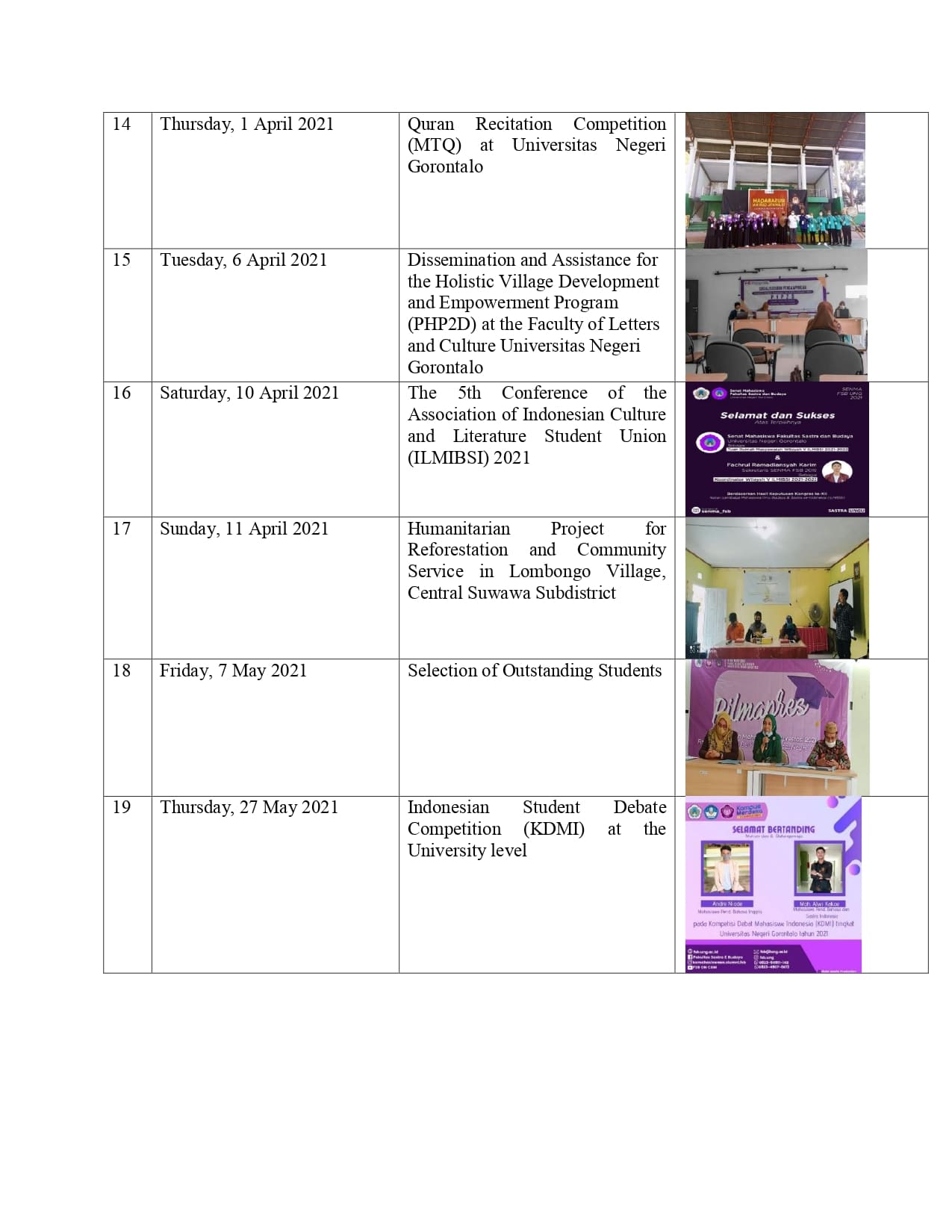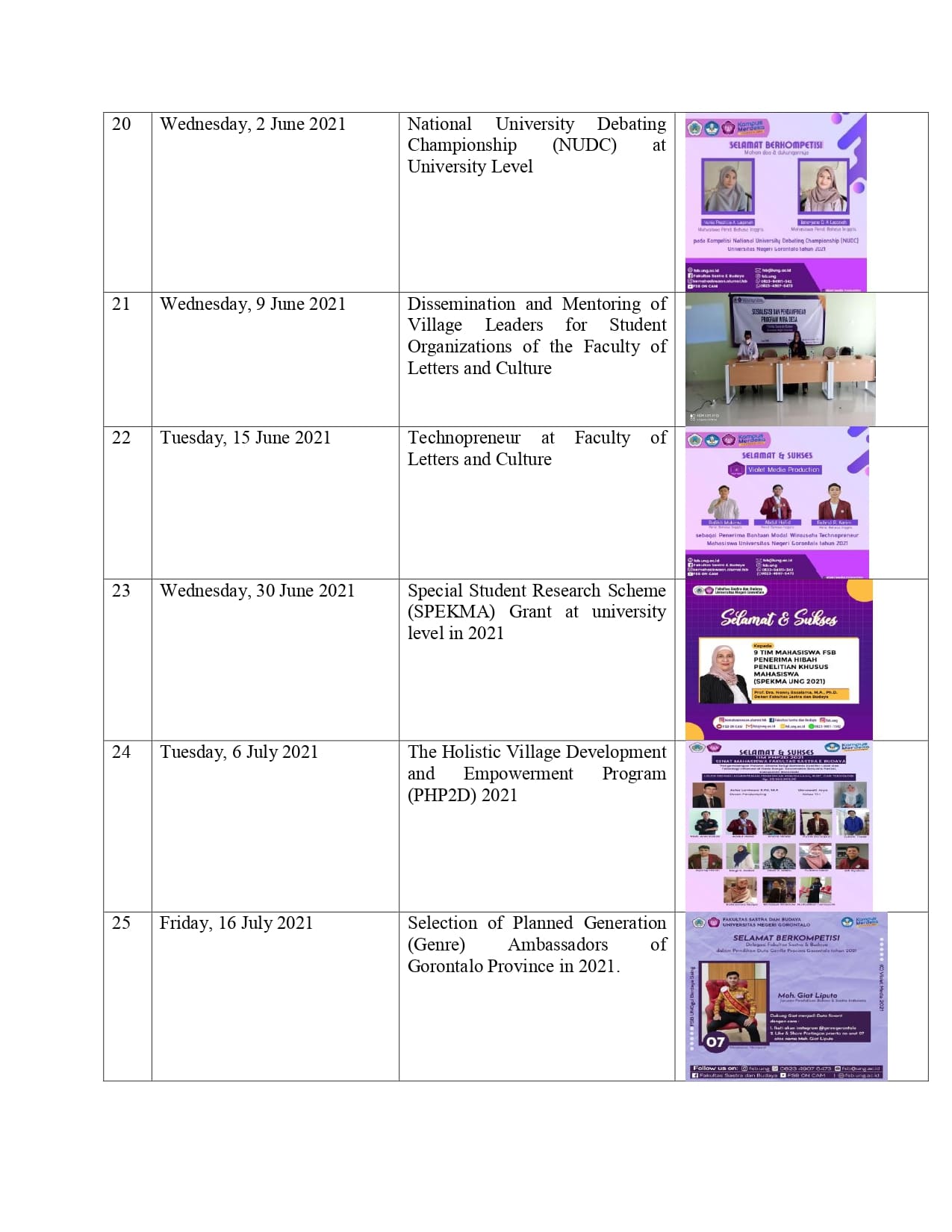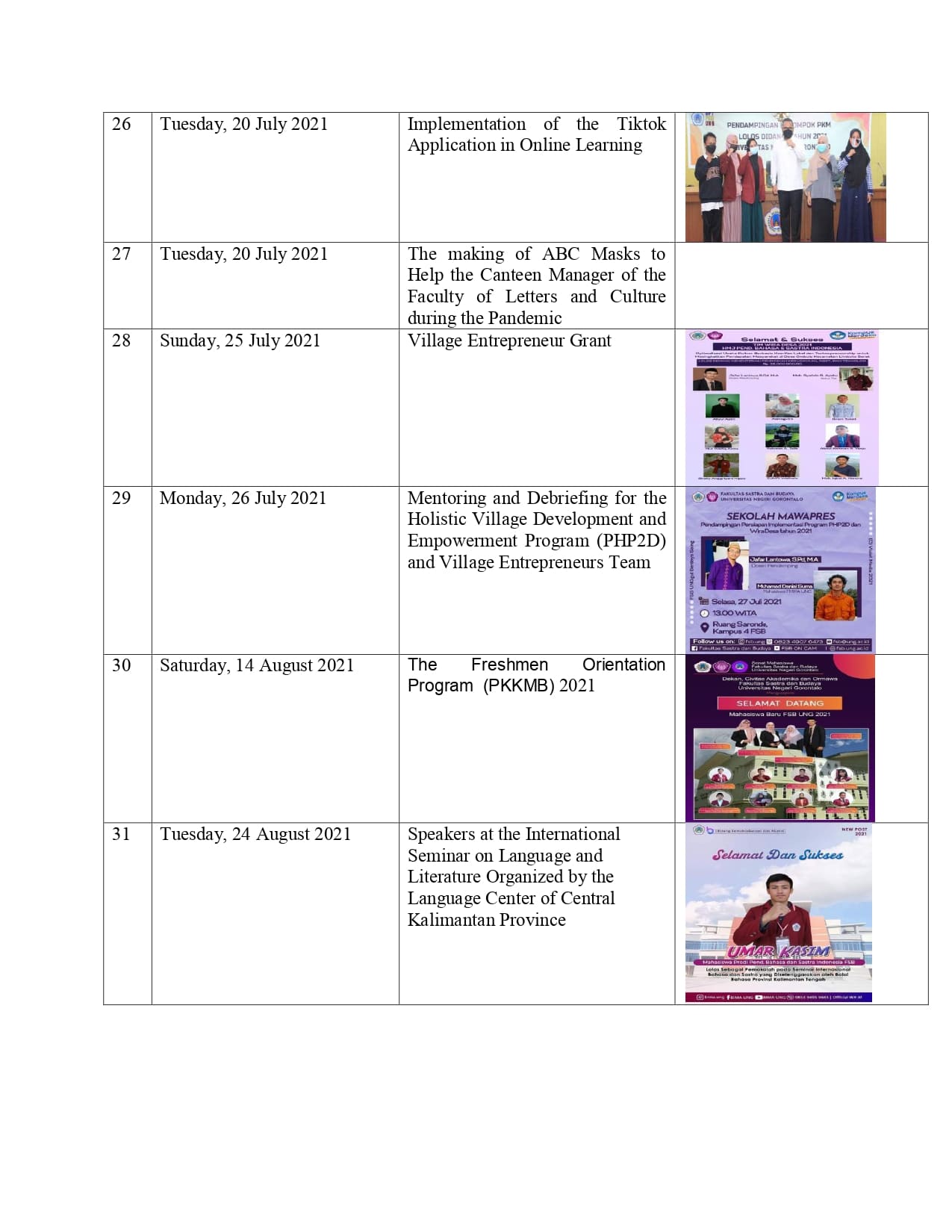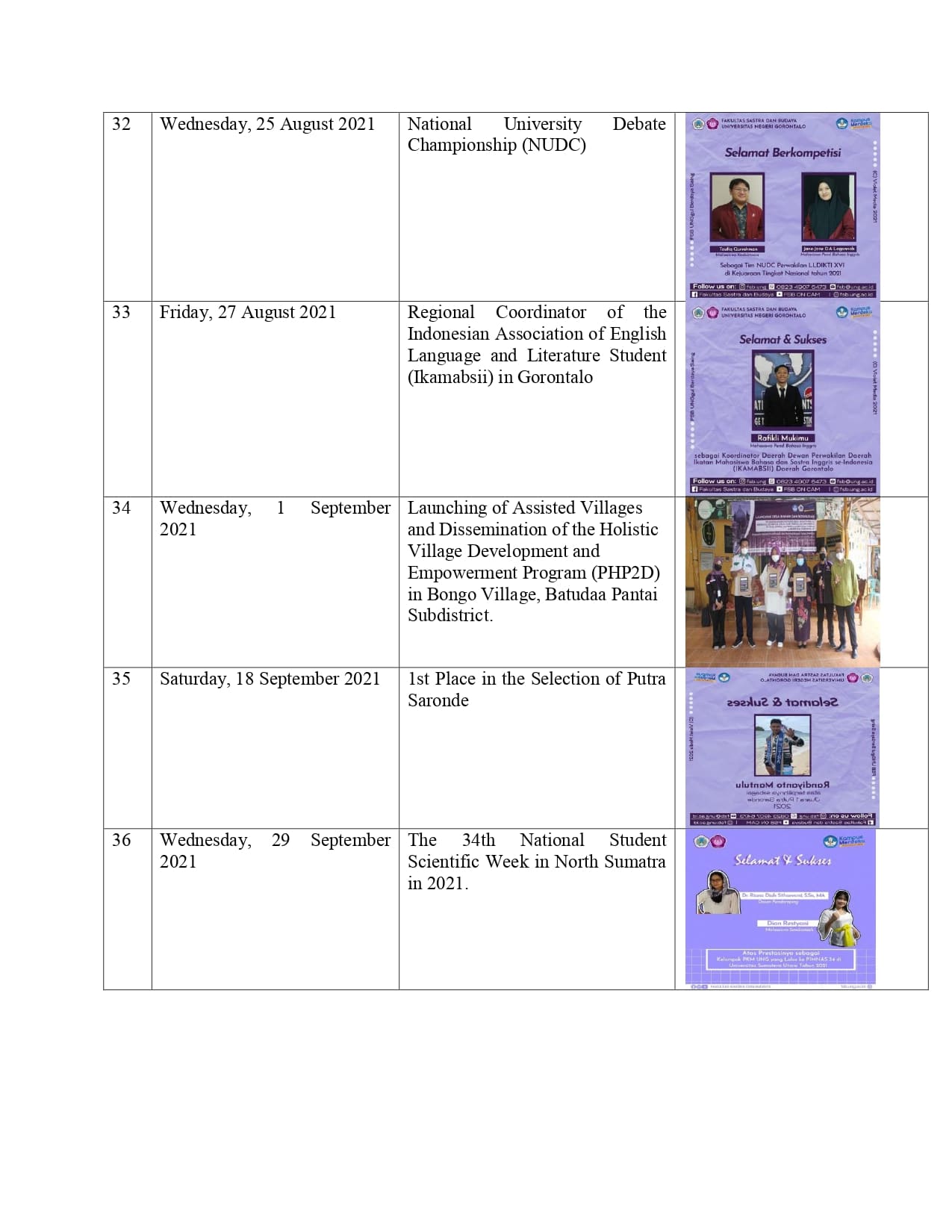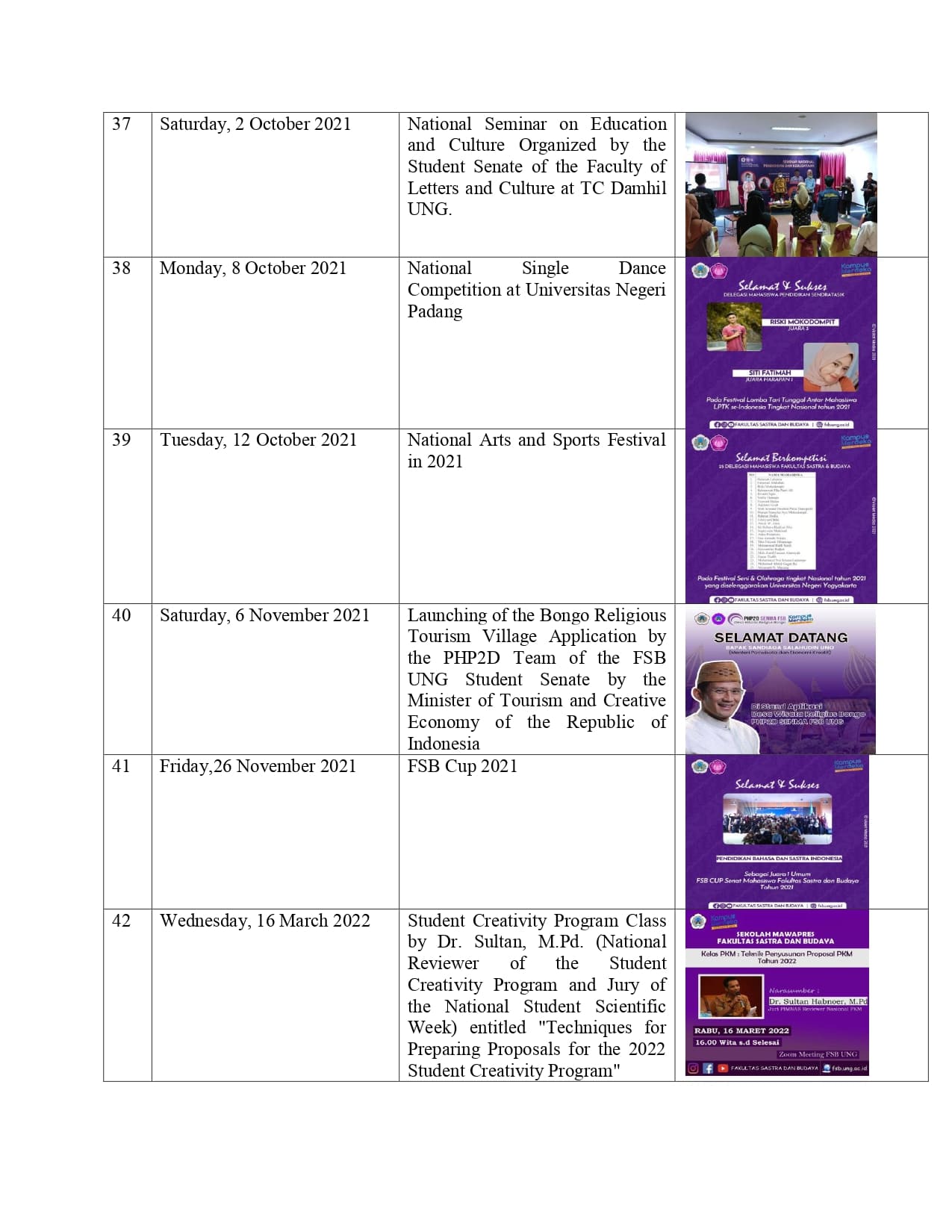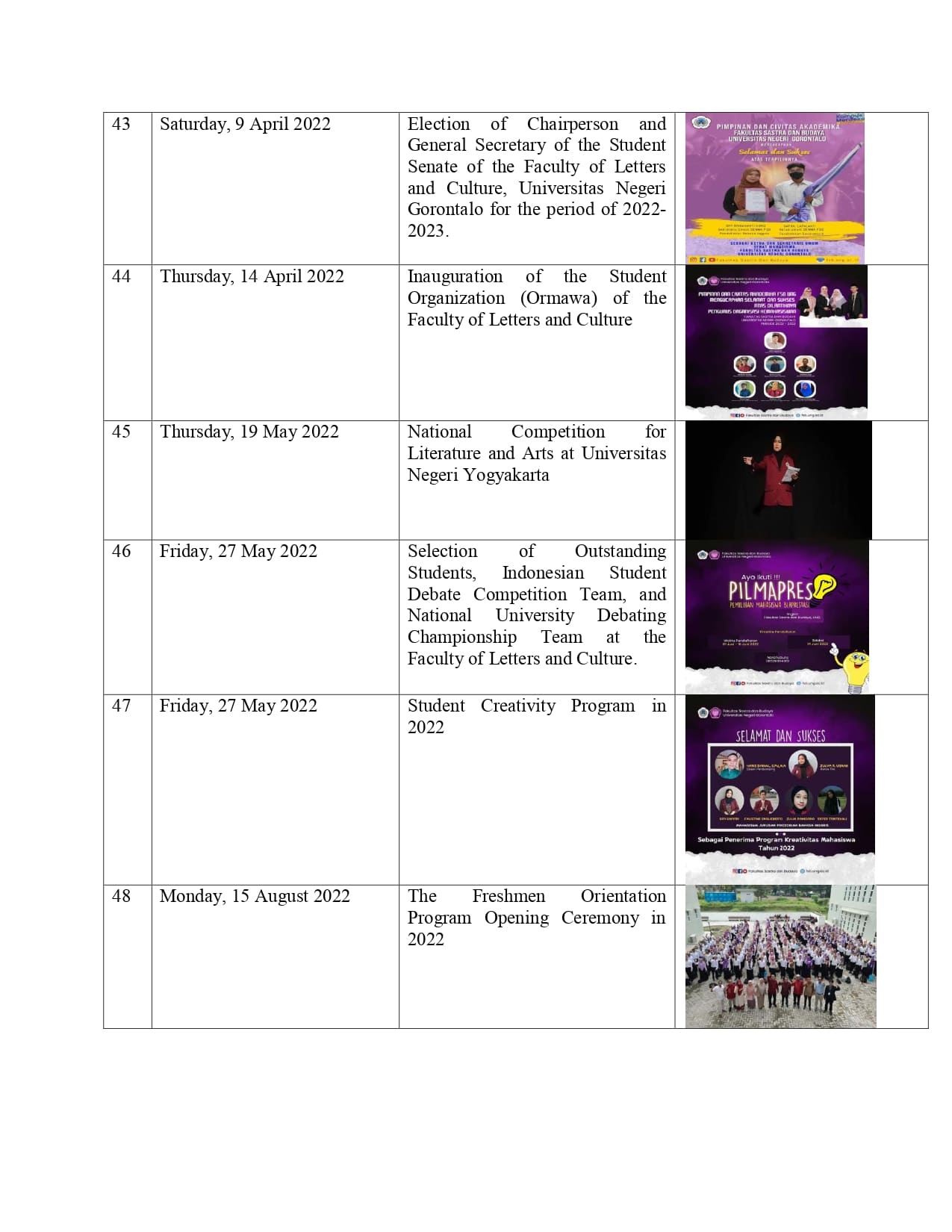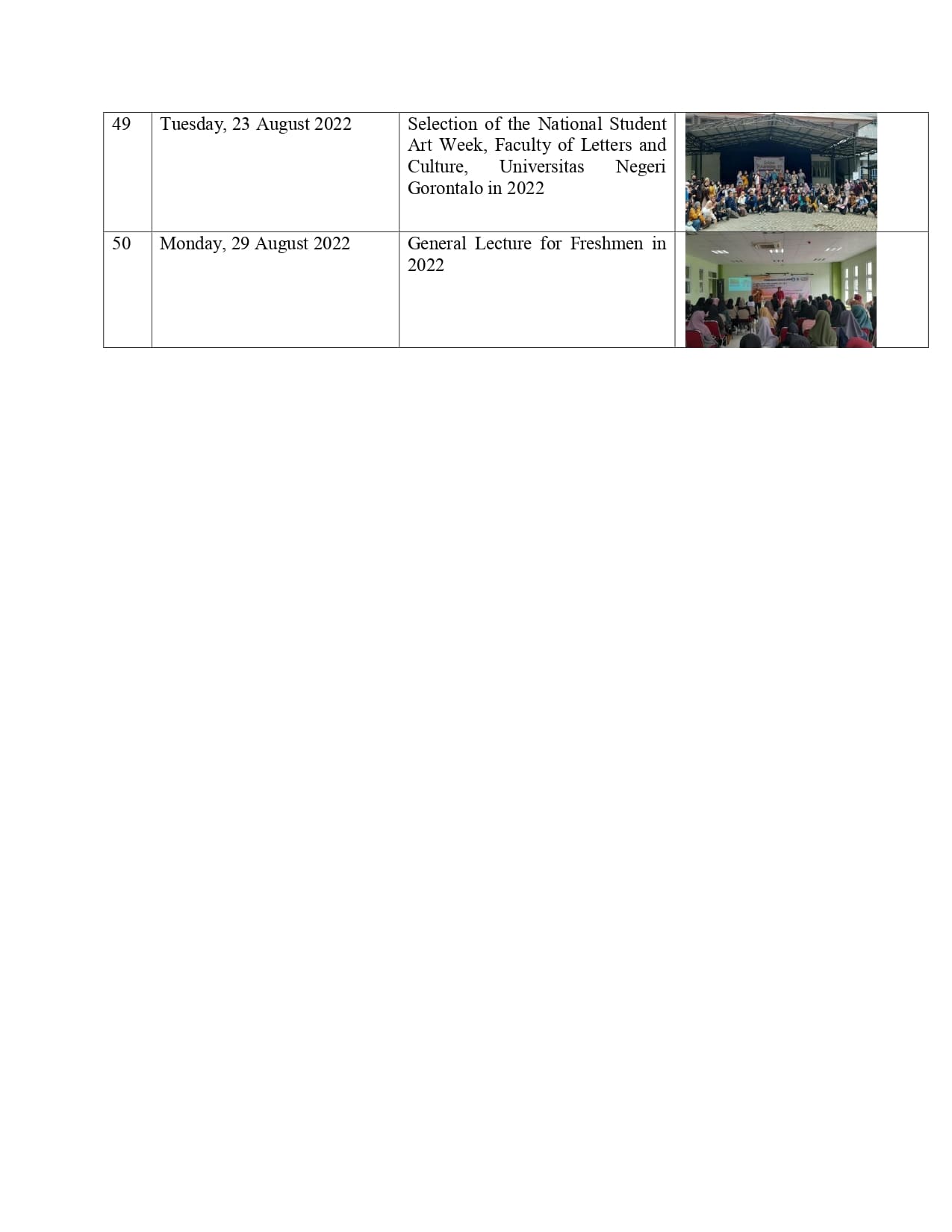TO FIND OUT MORE INFORMATION ABOUT THE ACHIEVEMENT OF IKU2 FOR STUDENTS EXPERIENCES OUTSIDE THE UNIVERSITY, PLEASE CLICK HERE / SCAN THE FOLLOWING BARCODE
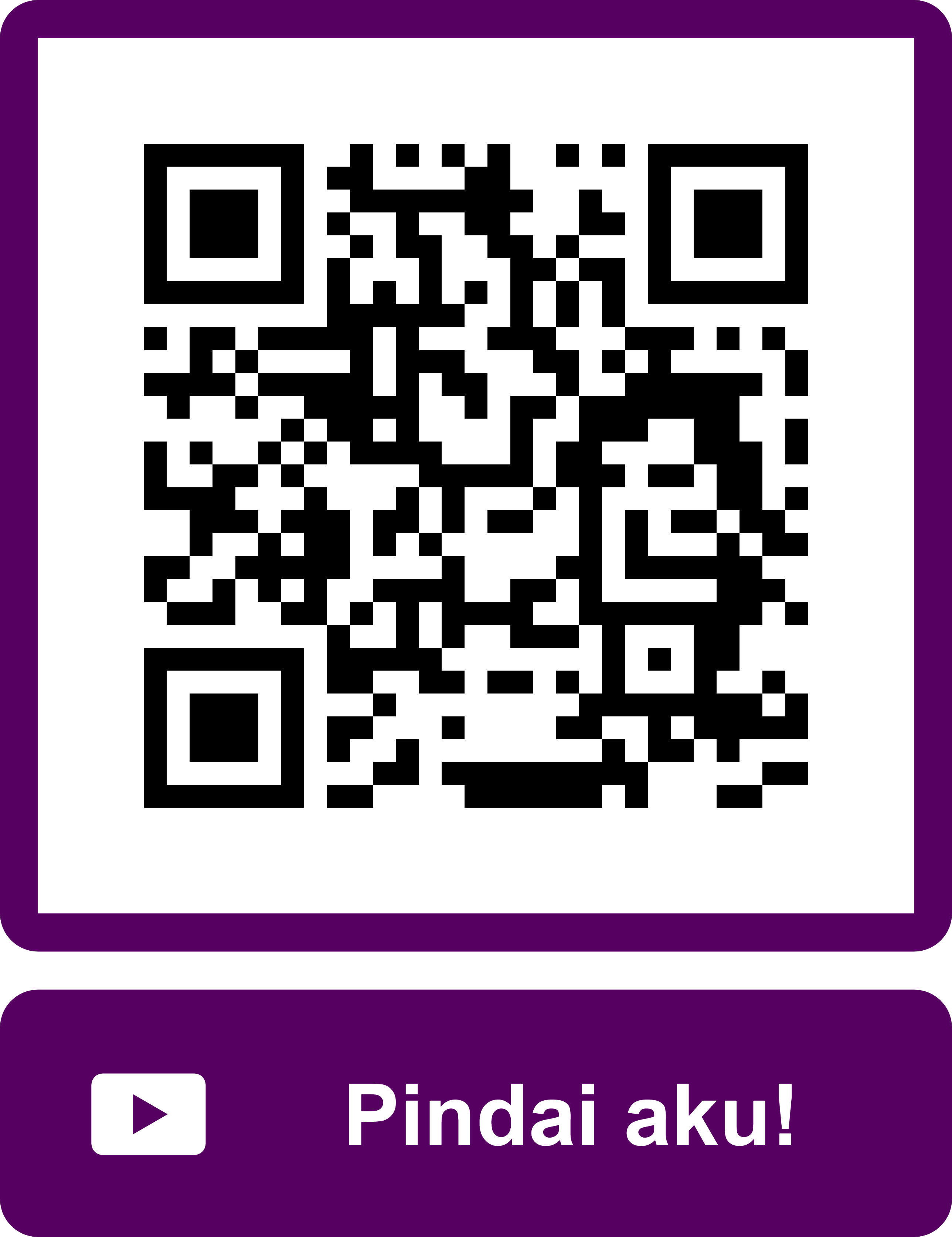
The role of education and coaching for students is essential in an effort to realize the ideals or goals of the university. Efforts to create quality, advanced, and independent human beings can be pursued through providing opportunities for students to develop their independence and practice and devote science, technology, and art to the development of society, nation and country through creative, innovative, and productive activities. The student affairs department of the Faculty of Letters and Culture focuses on developing the quality of its human resources on three main points, including:
1. Knowledge quality development
Students as academics need to be encouraged to be able to increase their knowledge, implement academic culture, create a scientific mindset, and build a culture of research and discussion by providing various facilities.
2. Skill development
Students are given the opportunity to develop their scientific and personal potential in the areas of their interests and talents through organizational and leadership development in various targeted training activities as preparation to become pioneers of the future young generation.
3. Attitude development
Student Development Program: Academic and Non-Academic Achievement Development Program
Program Directions:
This program is directed at efforts to encourage students to have a passion and apply a culture of reasoning and academics to increase their intellectual potential and mastery of the knowledge they are engaged in. Reasoning programs are held in academic forums and in intradisciplinary and interdisciplinary scientific competitions, at local, regional, national, and even international levels. The development of interests and talents also needs to be carried out by students through participation in various competitions according to their interests and talents. The reasoning, interest, and talent development program consists of several activity programs, including:
1. Student Creativity Program (PKM)
PKM was developed to deliver students to the level of creativity and innovation based on mastery of science, technology, and faith. To prepare themselves to become intellectual leaders and independent and wise entrepreneurs, students are given the opportunity to implement their abilities, skills, and responsibilities, build teamwork, and develop their independence through creative activities in the disciplines they are engaged in.
Initially, there were five activities offered in the Student Creativity Program (PKM): PKM-Research (PKM-P), PKM-Entrepreneurship (PKM-K), PKM-Community Service (PKM-M), PKM-Technology Application (PKM-M). PKM-T), and PKM-Scientific Writing (PKM-I). However, since January 2009, Ditlitabmas has managed 6 (six) PKMs. The Student Writing Competition (KKTM), which was originally the task of the Academic Directorate, is now being managed by Ditlitabmas. Because of its identical nature to PKM-I, KKTM is then managed jointly in PKM-Writing (PKM-KT). Thus, the PKMKT contains two writing programs: PKM-Scientific Articles (PKM-AI) and PKM-Written Ideas (PKM-GT). PKM-I or hereinafter referred to as PKM-AI which is an article of the results of activities, is no longer competed in the National Student Scientific Week (PIMNAS), but is published in e-journals. Meanwhile, PKM-GT, which has the opportunity to be discussed in an open forum, is positioned as a substitute for PKM-AI at PIMNAS. In 2011, the number of PKM activities increased to 7 (seven) with the introduction of PKM-Karsa Cipta.
In 2015, there was a transfer of PKM management from the Directorate of Research and Community Service (DRPM) to the Directorate General of Learning and Student Affairs (Ditjen Belmawa). In 2019, a social media-based PKM was introduced, namely PKM-GFK (Constructive Futuristic Ideas) which has the opportunity to be competed at PIMNAS. Changes in the Ministry, which was originally the Directorate General of Belmawa to become Belmawa under the Directorate General of Higher Education of the Ministry of Education and Culture occurred in 2020. In line with the development of science and standard terms in science and to facilitate understanding of the main objectives of each PKM, starting in 2021, PKM- Research (PKM-P) was changed to PKM-Research (PKM-R), PKM-Community Service (PKM-M) was changed to PKM-PM, and PKM Application of Technology (PKM-T) was changed to PKM-Application of Science and Technology (PKM-P). PI). Activities in PKM-Constructive Futuristic Ideas (PKM-GFK) which initially submitted videos to be assessed and received incentives, starting in 2021, were changed to submitting funding proposals to compile videos. In PKM-R, the characteristics of exact research (PKM-RE) and social humanities research (PKMRSH) are different. Starting in 2022, the PKM-R guidelines between PKM-RE and PKM-RSH are separated, where each has its own PKM guidelines to obtain optimal results. In 2022, PKM Written Ideas (PKM-GT) was changed to PKM Written Futuristic Ideas (PKM-GFT). The change is intended so that the proposed idea contains a futuristic element. In the same year, PKM Constructive Futuristic Ideas (PKM-GFK) was changed to PKM Video Constructive Ideas (PKM-VGK). The change is intended so that the ideas submitted contain elements of constructive communication content in the form of videos.
There are six types of activities offered in the PKM program: (1) PKM-Exact Research (PKM-RE), (2) PKM-Humanities Social Research (PKM-RSH), (3) PKM-Entrepreneurship (PKM-K), (4) PKM-Community Service (PKM-PM), (5) PKM-Application of Science and Technology (PKM-PI), (6) PKM-Karsa Cipta (PKM-KC), (7) PKM-Innovative Works (PKM- KI), (8) PKM-Video Constructive Ideas (PKM-VGK), (9) PKM-Written Futuristic Ideas (PKM-GFT), and (10) PKM-Scientific Articles (PKM-Al). The explanation of the Student Creativity Program is as follows:
1. PKM-Exact Research (PKM-RE) is an in-depth science-based observation to reveal new information in the exact field
2. PKM-Research Social Humanities (PKM-RSH) is an in-depth observation based on science and technology to reveal new information in the Social Humanities and Arts
3. PKM Kewirausahaan (PKM-K) is an in-depth observation based on science and technology to reveal new information in the Social, Humanities and Arts
4. PKM-Community Service (PKM-PM) is PKM Entrepreneurship (PKM-K)
5. PKM-Applied Science and Technology (PKM-PI) is a science and technology (technology/management) solution for profit partners
6. PKM-Karsa Cipta (PKM-KC) is a work in the form of a functional initiative construction
7. Innovative PKM-Karya (PKM-KI) is the result of innovative functional work of full-scale solutions, based on science and technology, and ready for mass production
8. PKM-Video Constructive Ideas (PKM-VGK) is an SDGs Issue and a National issue
9. PKM-Written Futuristic Ideas (PKM-GFT) is a written work containing ideas in the form of the concept of future changes
10. PKM-Scientific Articles (PKM-Al) are scientific articles resulting from student academic activities
2. National Student Scientific Week
PIMNAS is a follow-up activity after the assessment and evaluation of the Student Creativity Program where students are asked to be more creative, innovative, and critical in presenting arguments about the research that has been carried out. Good Soft Skill abilities will increase student creativity in innovation and good communication. The PKM team is still required to be able to show the highest level of creativity and usefulness of their intellectual products. Thus, criticism, suggestions, and praise will be important components in students' efforts to improve their academic performance in the future.
3. Selection of Outstanding Students (Mawapres)
Mawapres are students with high academic achievements in the disciplines of science/technology/art, have the spirit of Pancasila, and are active in intra and extra-curricular activities. Pilmapres (Election of Outstanding Students) is undergoing changes starting in 2022, especially with the aim of synergizing the assessment of various abilities needed in the community. The excellence of outstanding students will be evaluated from the aspect of knowledge and skills, such as communication, collaboration, critical thinking, creativity, and other excellent characters. In addition, the selection procedure will be carried out in stages, with the principle of equality between state universities and private universities, based on regional representation, accompanied by the provision of life skills in the final stage.
The requirements are (1) to be registered as an active student on the PD-Dikti website and in the sixth semester undergraduate program and below; (2) Not more than 22 years old on January 1, 2022 as evidenced by an Identity Card (KTP) or a Limited Stay Permit Card (KITAS); (3) Has never been a finalist for Pilmapres at the National Level; 4. Attach a cover letter from the board of directors of the university for student affairs (Vice Chancellor/Chairman/Director) stating that the person concerned is the official representative of the outstanding undergraduate student from the university. Each university can only send 1 (one) participant in the Undergraduate Program.
4. Indonesian Student Debate Competition (KDMI)
The development of student competencies is carried out in full in the cognitive, affective, and psychomotor aspects. In developing these competencies, various necessary efforts are required, such as participation in academic competitions. One of them is the Indonesian Student Debate Competition (KDMI). This competition demands broad insight, good language skills, and the ability to argue. Good language skills will improve students' communication skills in interacting with the international community, while argumentation skills will increase students' ability to make decisions based on logical and factual analysis. Recognizing the importance of debate competitions for improving the quality of higher education graduates, the National Achievement Center of the Ministry of Education and Culture developed this activity through the Indonesian Student Debate Competition (KDMI). This annual activity is a positive event for students throughout Indonesia to show their best ability in critical thinking and communication, increase self-confidence, develop networks between universities, and foster a sense of unity and pride in the diversity of the nation and culture.
5. National University Debating Championship (NUDC)
The development of student activities is directed at developing their potential to become human beings who are faithful and pious, have noble character, are knowledgeable, capable, creative, skilled, competent, and cultured. One of these coaching efforts is through debate competitions, one of which is the National University Debating Championship (NUDC).
NUDC demands students' ability to express their ideas in English and master global knowledge, analyze, make judgments, and convince the public. In the debate, students will be faced with real problems experienced by a society or nation. Students must be able to take a position and convince the public that their position is correct and appropriate. Therefore, debate is the right medium to train students' negotiation and argumentation skills on an international scale. Educational institutions in Indonesia should carry out debate competitions between students in the context of internalizing the spirit of positive competition which contains demands for communication and argumentation skills.
6. National Student Art Week (Peksiminas)
National Student Art Week (Peksiminas) is the peak of student activities in developing students' artistic talents and interests. PEKSIMINAS is a continuous activity that becomes a forum for students to improve the quality and ability of their practical arts, such as sound, performance, literature, and visual arts. This activity is expected to be able to improve and develop students' artistic achievements and creations to enrich the nation's culture based on Bhinneka Tunggal Ika. Peksiminas has 15 competitions as shown in the following table
| No | Competition | Information |
| 1 | Dangdut | Single (Men dan women) |
| 2 | Seriosa | Single (Men dan women) |
| 3 | Keroncong | Single (Men dan women) |
| 4 | Pop | Single (Men dan women) |
| 5 | Choir | Group |
| 6 | Poetry Reading Contest | Single (Men dan women) |
| 7 | Monologue | Single |
| 8 | Dance | Group |
| 9 | Short Story Writing | Single |
| 10 | Scriptwriting | Single |
| 11 | Poetry Writing | Single |
| 12 | Poster Design | Single |
| 13 | Painting | Single |
| 14 | Comic Strip | Single |
| 15 | Photography | Single |
7. The National Student Sports Week (POMNAS)
The National Student Sports Week (POMNAS) is held as part of the student sports competition system. POMNAS is a student sports event at the national level which is part of the history and involvement of Indonesian youth in developing sports in the country. POMNAS plays a role in fostering and searching for superior talent, especially students from universities in Indonesia.
| No | Competition |
| 1 | Athletics |
| 2 | Basketball |
| 3 | Volleyball |
| 4 | Badminton |
| 5 | Futsal |
| 6 | Karate |
| 7 | Rock climbing |
| 8 | Martial arts |
| 9 | Petanque |
| 10 | Swimming |
| 11 | Sepak takraw |
| 12 | Taekwondo |
| 13 | Tarung Derajat (Mixed Martial Arts) |
| 14 | Tennis |
8. Musabaqah Tilawatil Quran (Quran Recitation Competition)
One of the goals of National Education, as mandated in Law Number 20 of 2003 concerning the National Education System (Sisdiknas), is to produce Indonesian people with knowledge, faith, piety, noble character, good personality, discipline, and good physical and mental health. spiritual. The development of Indonesian people as a whole, including mental-spiritual development, can only be realized through appropriate methods, strategies, and activities that have value.
Students, as the next generation, are human resources that need to be forged properly and seriously, not only in mastering science and technology, but also in developing their character and personality. One of the strategic activities to realize the principles contained in the goals of National Education is Musabaqah Tilawatil Qur'an (MTQ) or Quran Recitation Competition for Students at the National Level.
MTQ for Students is not only a routine ceremonial in reading the Qur'an, but also demands to practice its teachings in everyday life. The competition consists of 15 (fifteen) contests which are described as follows:
1. Musabaqah Tilawatil Qur’an (TQ)
2. Musabaqah Tartilil Qur’an (TL)
3. Musabaqah Qira’at Sab’ah (QS)
4. Musabaqah Hifzhil Qur’an 5 juz (HQ5)
5. Musabaqah Hifzhil Qur’an 10 Juz (HQ10)).
6. Musabaqah Hifzhil Qur’an 20 Juz (HQ20)
7. Musabaqah Hifzhil Qur’an 30 Juz (HQ30)
8. Musabaqah Khaththil Qur’an (KQ)
9. Musabaqah Khaththil Qur’an (KQ)
10. Musabaqah Fahmil Qur’an (FQ)
11. Musabaqah Syarhil Qur’an (SQ)
12. Musabaqah Karya Tulis Ilmiah Kandungan Al-Qur’an (KTIQ)
13. Musabaqah Debat Ilmiah Kandungan Qur’an dalam Bahasa Arab (DIA)
14. Musabaqah Debat Ilmiah Kandungan Qur’an dalam Bahasa Inggris (DII)
15. Musabaqah Desain Aplikasi Komputer Al-Qur’an (DAQ)
16. Musabaqah Pembacaan Kitab Maulid Nabi Muhammad SAW (MMN)
